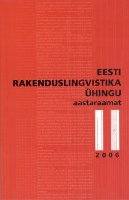Kõrgharituks teises keeles
Delivering higher education in a second language
Author(s): Birute KlaasSubject(s): Language and Literature Studies
Published by: Eesti Rakenduslingvistika Ühing (ERÜ)
Keywords: second language; second language acquisition; bilingual education; language policy; education policy; Estonian
Summary/Abstract: The article provides an overview of the organization of the one-year Estonian Studies Programme at the Estonian public universities with a focus on the experience of the University of Tartu. The Estonian Studies Programme is an 800-hour preparatory course of the Estonian language and culture designed for the graduates of the Russian-medium schools in Estonia. The quantitative analysis concentrates on the attitudes, motivation, and evaluation of the lecturers and the non-native students in regard to the Estonian Studies Programme. The research material comes from the interviews with the Estonian language lecturers of the language centres and the course evaluation questionnaires completed by the students. The analysis highlighted the following strengths of the Estonian Studies Programme: intensive studies in the language environment, combination of the language and culture studies, sufficient preparation to begin specialty studies at the faculty, since 2001 no students have been dismissed because of poor academic proficiency, the students are highly motivated, excellent teaching quality, and a safe environment that enables students to integrate into the university life, the number of students who have the need to participate in the Estonian Studies Programme is on the decline. Besides the obvious strengths, the following weaknesses could be observed: prolonged study period, postponement of specialty studies, poor specialization, heterogeneity of the study group in respect to the level of the Estonian language. The article concludes that the well-motivated non-Estonian students are able to study successfully in the Estonian language. The percentage of non-Estonian students admitted to the state-commissioned study places is similar compared to native speakers of Estonian. However, one can observe some differences in the completion of the curriculum within the nominal study period – native Estonian speakers graduate sooner in comparison with non-Estonians. At present it is difficult to say whether the prolonged study period can be explained by poor language skills or some other factors. Additional Estonian studies during the specialty studies definitely result in the improved performance.
Journal: Eesti Rakenduslingvistika Ühingu aastaraamat
- Issue Year: 2006
- Issue No: 2
- Page Range: 109-119
- Page Count: 9
- Language: Estonian

